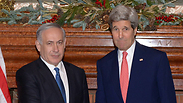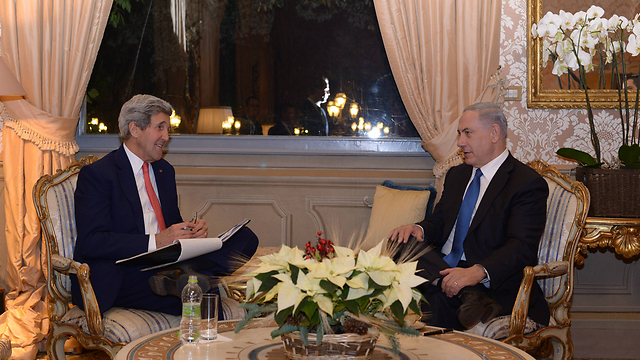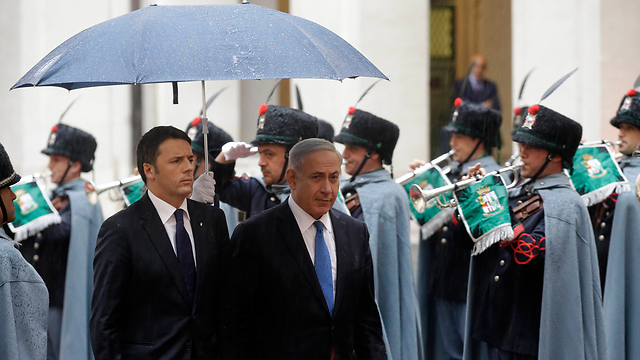
Netanyahu: European support for Palestinians 'endangers Israel'
'The attempts of the Palestinians and of several European countries to force conditions on Israel will only lead to a deterioration in the regional situation,' prime minister says.
Prime Minister Benjamin Netanyahu accused European governments on Monday of siding with the Palestinians over their latest UN bid for statehood, saying their demands would endanger his country.
"I said that the attempts of the Palestinians and of several European countries to force conditions on Israel will only lead to a deterioration in the regional situation and will endanger Israel," the prime minister said in a statement.
"Therefore, we will strongly oppose this."
The comments followed almost three hours of talks in Rome between Netanyahu and US Secretary of State John Kerry, who jetted across western Europe on Monday for a hectic round of diplomatic meetings on the topic.
A State Department official said Kerry and Netanyahu "had a long and thorough discussion about Israel's security and developments at the United Nations."
Netanyahu sought assurances from Kerry that Washington would block efforts by Palestinians and Europeans on Palestinian statehood.
"Our expectation is that the United States will stand by its position for the past 47 years that a solution to the conflict will be achieved through negotiations, and I do not see a reason for this policy to change," Netanyahu told reporters.
Before the meeting, Israel put the United States on notice that it expected Washington to exercise its U.N. Security Council veto against any resolutions setting a time frame.
Netanyahu declined to comment on whether he was given an assurance by Kerry that the United States would exercise its veto. A source with knowledge of the talks who spoke on condition of anonymity said the Israeli leader had indeed asked for such an assurance.
A senior State Department official said Washington had made clear in discussions that it would oppose certain moves.
"We've made clear throughout these discussions with all of our interlocutors that there are certain things we could never support. (I'm) not going to outline those publicly," the official said.
The Palestinians have said they will submit an Arab-backed draft text to the UN setting a two-year deadline for Israeli troops to withdraw from the West Bank as early as Wednesday.
France has put forward a more nuanced version setting a two-year timetable for concluding a peace treaty, without mentioning the withdrawal of Israeli forces.
From Rome, Kerry flew into Paris for a late-night dinner meeting with the foreign ministers of France, Britain and Germany inside the airport on a short stopover on his way to London, seeking clarification on the French-led resolution bid.
US officials said there was no consensus among the European powers on the best way to proceed.
Traditionally the US has used its power of veto at the UN Security Council to shoot down what it sees as moves against its close regional ally, Israel.
US officials told reporters accompanying Kerry that Washington has not yet decided whether to veto or back the French-led UN initiative.
French Foreign Minister Laurent Fabius told AFP they were looking for "a resolution which everyone can get behind.
"Even if the Palestinians have a text in their hand, the Americans have already said that they will veto it."
Growing impatience
Netanyahu earlier said: "We will not accept attempts to dictate to us unilateral moves on a limited timetable."
Jordan - which Palestinians said would submit their resolution - said it had no immediate plans to push for an early UN vote.
Its Ambassador Dina Kawar to the UN told reporters: "Secretary Kerry is having meetings in Europe with a number of ministers so we are waiting to see what happens."
US officials have indicated that Washington did not find the Palestinian draft acceptable but said that with matters still fluid, it was premature to take a position now on any particular Security Council resolution.
"Whether we have the nine votes at the Security Council or we don't, the decision has been taken to present the Palestinian-Arab resolution in the Security Council on Wednesday," said Wasel Abu Youssef, an official of the Palestine Liberation Organization, the Palestinians' highest decision-making body, led by President Mahmoud Abbas.
Palestinian UN Ambassador Riyad Mansour said that "on Wednesday, most likely a draft will be put in blue." This means the draft resolution could be put to a vote as soon as 24 hours later, though it does not guarantee it will be put to a vote.
There is a growing impatience in Europe over the Israel's recent actions and the failure by both sides to make progress in peace talks, amid fears the Middle East risks spiralling into even greater chaos.
Several European parliaments have called on their governments to move ahead with the recognition of a Palestinian state.
The US administration opposes moves to bind negotiators' hands through a UN resolution - particularly any attempt to set a deadline for the withdrawal of Israeli troops from the West Bank.
But a US veto risks running contrary to Washington's avowed aim of a Palestinian state and would anger key Arab allies - many of whom are much-needed partners in the US-led coalition against Islamic State militants.
"We will stand firm in the face of any diktat," the prime minister said ahead of Monday's talks.
Kerry left for London where he was due to meet chief Palestinian negotiator Saeb Erakat and the secretary general of the Arab League, Nabil al-Arabi, on Tuesday.
France's Fabius is also to meet with Arabi on Tuesday.
Diplomatic sources say Paris is hoping to persuade the Palestinians to back their compromise resolution, rather than risk a US veto of the more muscular Arab version.
But the Palestinians appear divided, as frustration grows over the snail's pace of diplomatic efforts, with the decision resting with Palestinian President Mahmoud Abbas.
UN Middle East peace process envoy Robert Serry briefed the Security Council on Monday and said any resolution outlining the parameters of an Israeli-Palestinian final status agreement would be important, but "not a substitute for a genuine peace process that will need to be negotiated between both parties."
Reuters contributed to this report.












